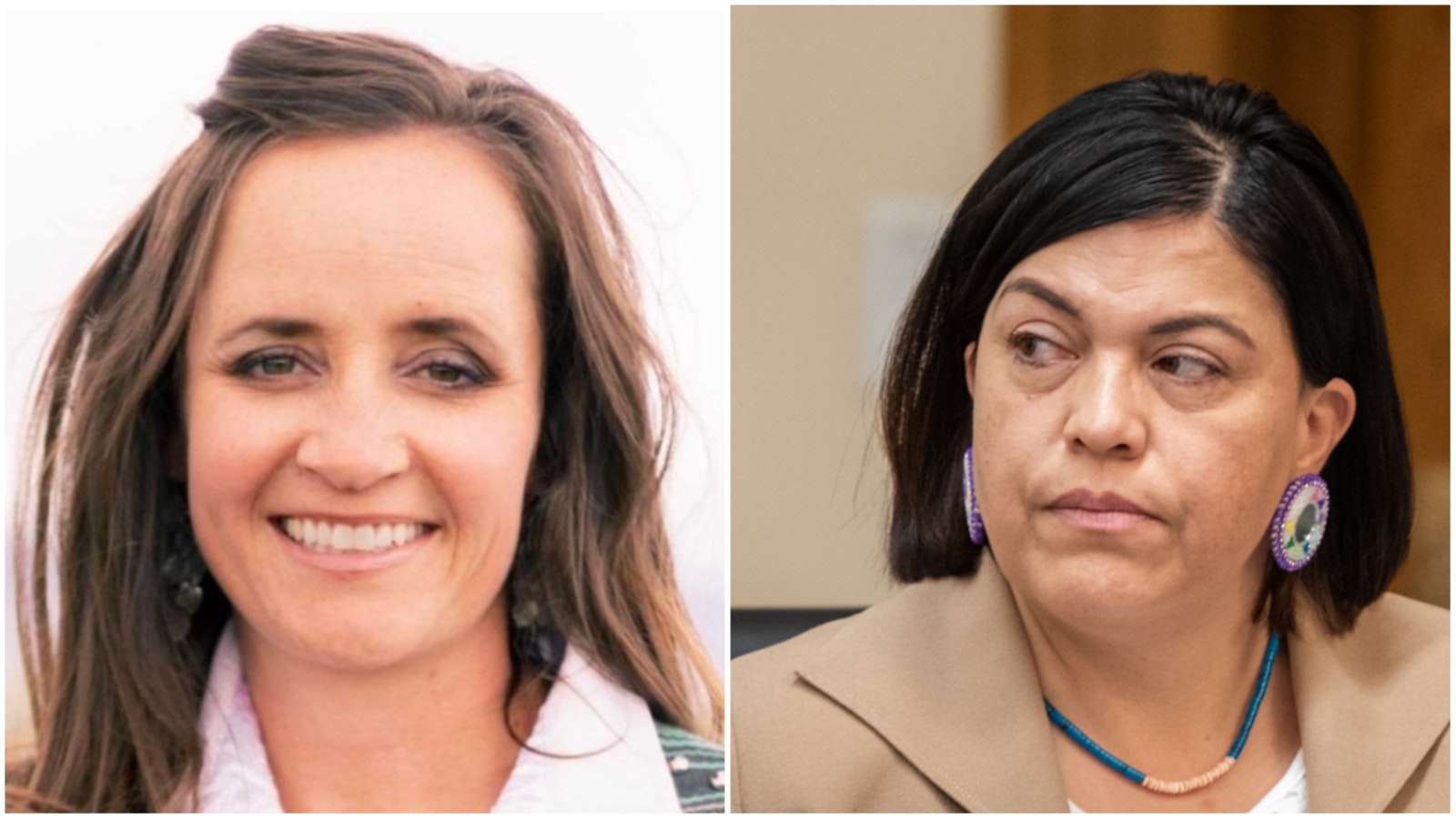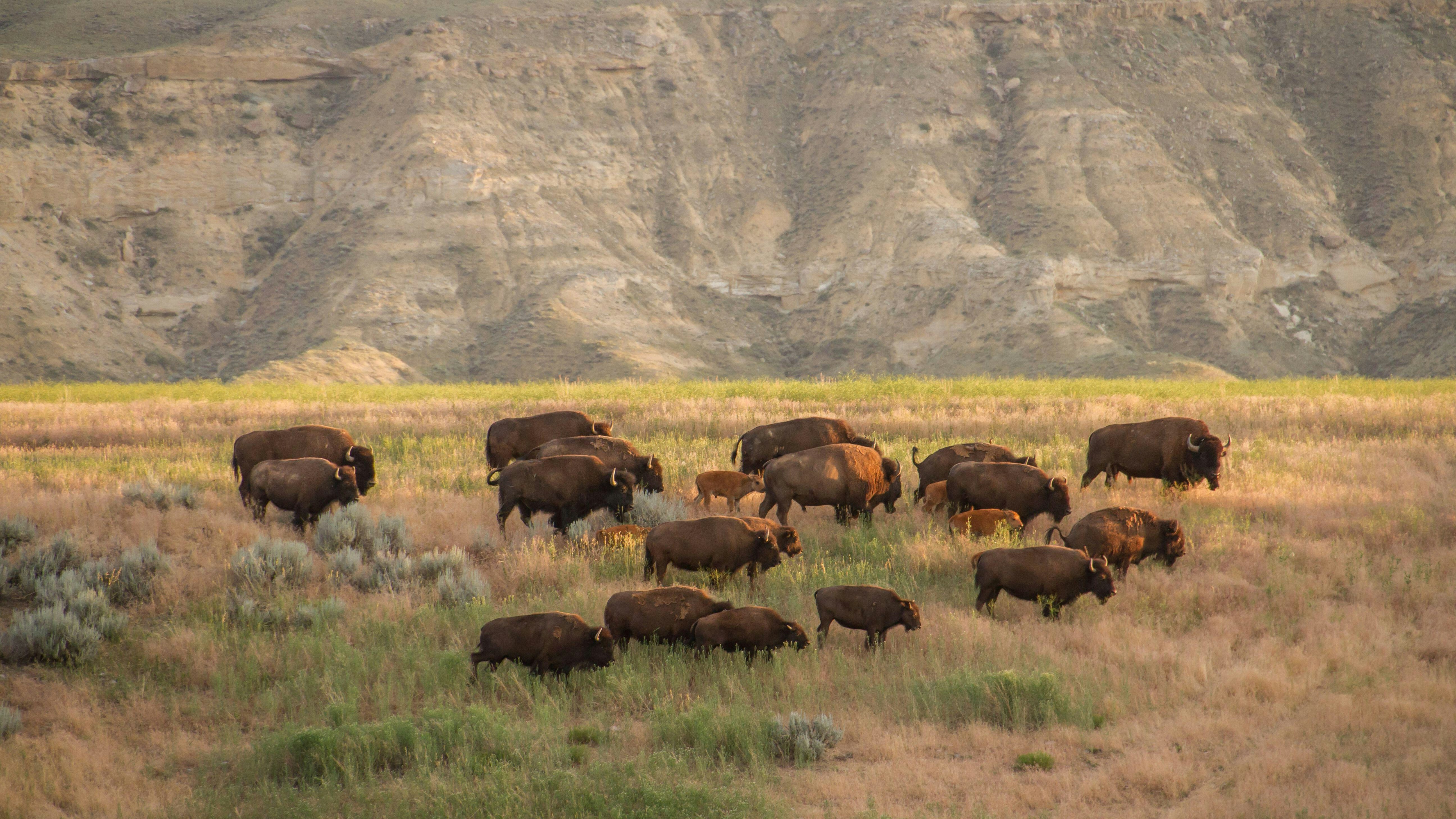The two women vying for Wyoming House District 33 launched opposite arguments on whether the federal government should control natives’ land and keeping abortion legal in Wyoming.
Rep. Andi LeBeau, D-Ethete, took on Republican challenger Sarah Penn in a Sunday debate in Fort Washakie hosted by the League of Women Voters. The two will face off Nov. 8 to represent House District 33, a district covering the Wind River Indian Reservation and other portions of Fremont County. Its population is about 66% American Indian, but current estimates put the registered voter split at about half native, half non-native.
Federal ‘Trust’
Moderator Ernie Over asked the candidates how they’d handle housing affordability challenges on the reservation.
Penn said that because so little of the land on the reservation is “deeded” – that is, directly owned by homeowners it’s difficult for people to get bank loans to buy a home.
“If the land is not deeded to you, the bank is not going to loan you money,” said Penn. “So that’s an avenue I’d be looking into exploring with the tribes.”
To change the land-ownership system on the reservation, Penn also would need to work with Wyoming’s congressional delegates.
The federal Indian Reorganization Act in 1934 placed all land not fully owned by individuals into a federal trust. Most of the land on the reservation is held and controlled by the federal government, though individual plots are technically owned by tribal members. Because the federal government has split entrusted land among homeowners’ descendants for nearly a century, one piece of land can have hundreds of official owners.
Though the law was designed to prevent tribal members from selling off their land quickly and cheaply to non-Indians, by giving the federal government control and holding power over the land, Penn said it’s this very trust system that now makes it difficult for tribal members to buy homes.
LeBeau disagreed, saying the trust system is what keeps reservation land “tribal.”
“I kind of cringe when I hear we need more deeded land,” said LeBeau. “When you deed land, you give that up out of trust.”
Once the land is out of trust, it can be sold to natives and non-natives alike. However, the U.S. Supreme Court ruled in 2020 that simply selling land to non-natives does not diminish a reservation’s boundaries.
LeBeau said yes, more banking institutions will work with transactions involving deeded land, as the ownership is clearer. But she said the tribes should be interested “as a sovereign nation” to keep the land “tribal.”
She said tribal governments should focus, with the state’s help, on securing “mostly” federal grants to alleviate homelessness and housing challenges.
Abortion
LeBeau is proudly pro-choice. She said the government has no business “following” women, or men, into the doctor’s office.
“I’m a very spiritual … proud woman. That’s my liberty and that’s my freedom, and at the end of the day, who’s going to judge me? My Creator. That’s between me, and Him, and nobody else,” said LeBeau.
Penn, conversely, said life begins at conception. She also said she reads the Wyoming Constitution’s equal protection provisions as applying to the unborn.
“I will be forever an advocate of life,” said Penn.
She said she feels sincerely for people contemplating abortion, but contends that the question concerns two lives, not just one.
Men And Women
Over reported that Wyoming has a high wage gap between men and women, with women making about 65 cents to every dollar made by a man.
LeBeau said legislation can fix the disparity.
“It’s a huge problem in Wyoming,” she said. “I’ve always supported legislation … (for) equal pay.”
LeBeau emphasized the value of women and the particular struggles they face while working and “raising babies.”
On the reservation, especially, many grandmothers are working while raising their grandchildren.
“Women are key. You’ll see them stepping up to nontraditional roles mainly held by men, and they should be,” she said.
Penn said lawmakers need to take into account basic, natural differences between men and women.
“Men and women are different, and that’s not a popular thing to say these days, but I think it’s the truth,” said Penn.
She said that women are naturally more nurturing and men naturally more physically strong. Some of Wyoming’s wage gap, she said, is due to the state’s reliance on extractive industries, which are full of physically difficult jobs.
Not as many women work in those industries, and a lot of mothers seek out part-time work or more flexible work so they can care for their children, said Penn.
“I have never made less than my male counterparts strictly because I’m female,” said Penn, who is a nurse practitioner. “You go to Walmart, you go to McDonald’s, you will not get paid less strictly because you’re female.”
Vaccine Mandates
LeBeau said the federal government should not be able to require school students to be vaccinated to participate in activities, but she said that the tribal governments should have the right to mandate masks on the reservation.
More than two years after the COVID-19 pandemic began, the intertribal government of the Northern Arapaho and Eastern Shoshone Tribes still has a reservation-wide mask mandate in place.
Before she became LeBeau’s campaign opponent, Penn was an outspoken critic of the reservation mask mandates.
Penn, like LeBeau, said the federal government has no business mandating vaccines. She added that it’s not in the government’s purview to dictate the terms of bodily autonomy.
LeBeau responded, saying, “Amen to that – in reproductive rights also, yeah.”
St. Stephen’s Indian School
Both women said they support the continued funding of St. Stephen’s Indian School – a school formerly controlled by a locally-elected school board, of which the federal government took control this summer after reporting sexual and other misconduct by some school officials.
Wyoming historically has given about $1.5 million annually to the school and is in talks to give roughly the same amount in the future. The maneuver is now complicated, since it’s unlawful for the state to give money directly to the federal government to help run the school.
The candidates disagreed when Penn said there should be efforts to scrutinize the other schools on the reservation for signs of similar misconduct issues.
LeBeau rebutted, saying local control is better than a state or other government investigation. The teachers, parents, guardians and elected school board members “know what’s best for their communities and their schools,” said LeBeau.
Horses, Poaching, Hemp, Garbage
LeBeau said she’d support state efforts to aid hemp cultivation on the reservation. Penn said she’d need to discuss it with all stakeholders but would like to push against efforts to market psychoactive versions of the plant. She said chemists can extract psychoactive chemicals from hemp.
Penn said she’d like to discuss enforcement of anti-poaching laws with the state and tribal governments.
There have been instances of non-tribal members poaching on tribal lands, in recent years.
LeBeau said the tribes should be able to mobilize “ceremonial leaders and our young warriors” as law enforcers against non-native poachers.
Penn said she’d like to continue legislative discussions to address problems with feral horses, on the reservation and throughout the state.
LeBeau said she’d like to revive prior efforts to help tribes construct and operate their own horse slaughterhouses, which she said could also improve the economy and employment on the reservation.
The reservation has a solid waste issue. Litter and illegal dump sites on the land have been attributed to tribal members who do not want to drive the long distances to get to the sparse garbage transfer stations in the county, and to non-native contractors and others who have reportedly used the vast reservation to avoid tipping fees.
LeBeau said dumping by non-natives is the main problem, and she would like more solid waste services offered by the town and county governments surrounding the reservation. Penn said she hasn’t arrived at a solution yet, because she hasn’t spoken to all the sovereign entities involved.





